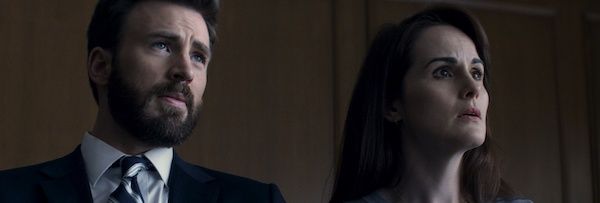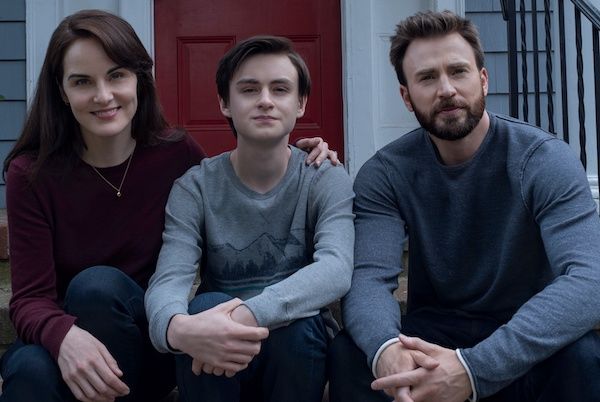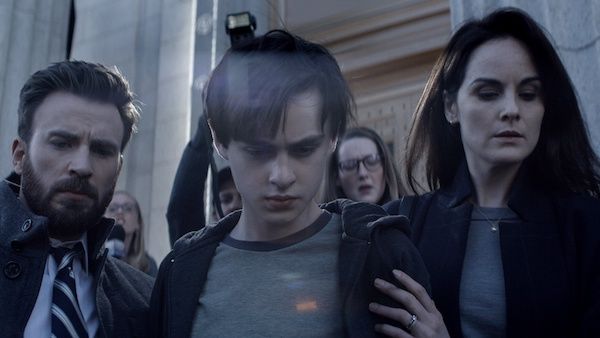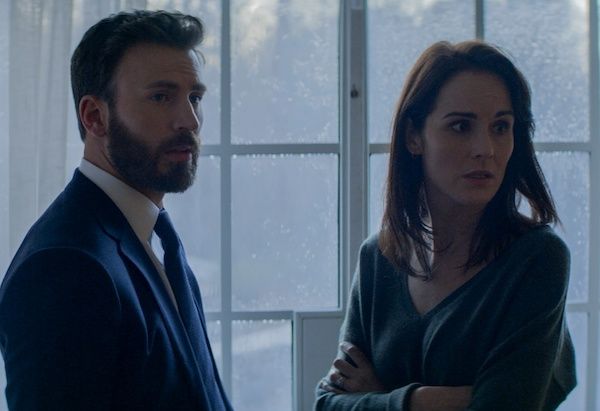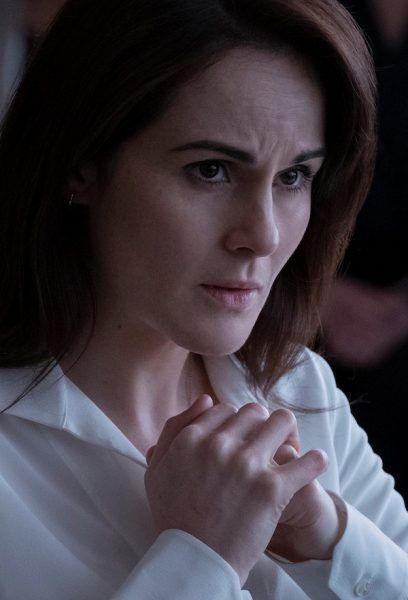Created by Mark Bomback and based on the best-selling William Landay book of the same name, the Apple TV+ original limited series Defending Jacob shows the effects of a shocking crime on one family in a small Massachusetts town. When middle schooler Jacob Barber (Jaeden Martell), son of Assistant District Attorney Andy Barber (Chris Evans) and his wife, Laurie (Michelle Dockery), is accused of murdering a fellow classmate, it puts the unconditional love for family on the line, and places parents at odds with each other over whether they believe their son when he proclaims his innocence.
During this 1-on-1 phone interview with Collider, Dockery opened up about the challenge of tackling Defending Jacob's subject matter, going on an intense emotional journey as Laurie, forming the Barber family dynamic with co-stars Evans and Martell, not letting her own opinion about a character influence her performance, what she thought about the story’s ending, and much more about the Apple TV+ original's intense ending and beyond.
COLLIDER: This show is very engrossing. You just can’t stop watching because you have to know what happened. When you read this, was it a page-turner?
MICHELLE DOCKERY: Yeah. With something like this, each episode has such an intensity that I think the weekly formula is great for this type of drama. It also gives a reason for people to talk about it, for the rest of the week, and make their assumptions about what’s going to happen. It feels like the old way, really, which is refreshing, in some ways, in this binge era.
What are your own viewing preferences, in that regard? When you watch something, do you like to binge all of the episodes at once, or do you like to be able to watch a few at a time?
DOCKERY: Yeah, it depends. I definitely like to watch more than one. I’ve just started watching Ozark, which I’m mad about. I love it. I’m quite late discovering it, and I have to watch at least two episodes of that, each time, but then I like to take a bit of a break. But it depends, really. Some things, I just binge right through. Other things require a little bit more time to digest it. People can do it any way they want, but with something like Defending Jacob, it’s good to digest just a couple of episodes at a time. It’s nice to keep the suspense up, as well, especially with this sort of genre.
Did you know how emotionally challenging it would be to do this show?
DOCKERY: I knew, going into it, that it would be. I welcome a challenge. I’ve always been like that. When I’m looking at the next job, I do like a bit of a challenge. I knew this would be because the emotional journey is such a roller coaster for the character, but playing that sort of character in an accent, as well, is another challenge. For me, it requires a little bit more preparation and sleep, leading up to those big scenes because each scene has a shock. She’s digesting each moment as it happens, and there’s a lot of emotion that comes with it. Laurie is dealing with it in a way where, at first, she’s losing control. And then, she has to regain her confidence and adjust to this new way of living. Out of the three of them, Laurie finds it the hardest, adjusting to this life, or at least letting go of their life before. Whether Jacob is innocent or not, Laurie carries this feeling that life will never be the same again because of what has happened. She worries for Jacob’s future, the worst case scenario being that he be convicted and goes to prison, and the other being, if he doesn’t, how will this affect him, going forward in his life. It was a lot of emotion to play, but we mapped it out quite well. The director (Morten Tyldum) and I had this great shorthand, for when I should go very far, and when I should hold in and have a much more restrained emotion.
Was it a challenge to pace yourself, emotionally, through this shoot?
DOCKERY: Yeah. And also, there was such a great energy on set. Despite the whole content of the show, it was a very light-hearted atmosphere. I need that when I’m working, so that I can just turn it on for the scenes that are emotional, and then come out of it, quite quickly, and have a laugh about something. When you’re working on something that’s intense, everybody is aware of having more relaxed, light-hearted moments, in between. That was good. It was a good balance.
This is a seemingly close knit family, until this incident happens that not only makes them question just how well they know their son, but how well they know each other, and everything just starts to unravel. How did you form that family dynamic, so that you could have that unraveling, throughout the series?
DOCKERY: None of it, we did consciously. That chemistry that we had as a family was perhaps down to being together for such a long time, on set. All of the house interior that you see, when they’re at the Barbers’ house, it was something six weeks, towards the middle and end of the shoot, when we were doing all of the scenes, from every episode, in the house, which is where you see the family at their closest. Perhaps that was useful because were just together, all the time. And when you’re working with people, all the time, of course, you build up a rapport and a closeness. We felt that, when we were doing it. We felt that we were a close family. We were also conscious of them being a very tactile family. What you then see, as the story unravels, is that gap widening and they become much more distant, particularly between Laurie and Andy. We thought it was really important to see that, particularly at the beginning, they are this really solid unit, and then, of course, they’re picked away at, as the case goes on, and their relationship begins to change.
Does it feel like, because these two really do have such a different way of approaching what’s going on and they go through such a different journey, if they had just communicated with each other, from the beginning, about what they were feeling, that things could have turned out very differently, at least between the two of them?
DOCKERY: Perhaps. There is a certain amount of Laurie feeling betrayed, in some way, for being lied to. She didn’t know about Andy’s father being in prison for an awful crime, and because of that, she begins to question her whole life, her marriage, her family and, of course, her son. So, maybe they could have communicated better, but I also think they just deal with it very differently. Andy, having had a difficult childhood, has developed much stronger coping skills than perhaps Laurie has, good or bad. She doesn’t find it easy to ignore what’s in front of them because she’s searching for the truth. She wants her son to be innocent, but she has her reasons to doubt. She saw Jacob when he was younger, and she has her reasons for feeling that way. She feels like she perhaps knows her son a little more. It’s complicated. Conflict makes the drama because they deal with it differently. If they had dealt with it in the same way, you wouldn’t get as much drama as part of the narrative. One of them definitely has more of a seed of doubt than the other.
What was it like for you to learn about where all of this would end up? You character makes very definite decisions, but we don’t have a definite answer as to whether or not Jacob did it, so what was it like for you to see where this family would be left?
DOCKERY: Actually, when I first signed on for this, I only saw the first four or five episodes. I had an idea of where it was going, of course, because I knew that book, as well, and was reading the book, in the early stages. Even though it differs somewhat from the book, I did have an idea, of course, of that ending. Like with any role, it’s important to not judge your character. I’ve learned, over the years, that sometimes you can play roles where your opinion of the character gets in the way. It doesn’t always make it an organic, smooth process, in your portrayal of it, so I really had to get into the shoes of her and how, in this moment, she would react, as each moment passes. I think, by the end, she’d had enough. I don’t think she can live with the idea that she will never know the true, and perhaps, deep down, she knows what the truth is. Maybe that’s what does it, in the end. What I like about the ending is that it is up for interpretation. The audience will decide what they think, whether it was intentional, what she did at the end, or it was a moment of a complete fog that she was in and it was an accident. I like that ending, that it’s ambiguous.
At this point in your life and career, how do you decide on the projects that you want to do? What is it that gets you interested and excited about the work?
DOCKERY: I don’t tend to be strategic, in a way that’s like, “Okay, I need to do this now because I just did X, Y and Z before.” It really comes down to the writing and the character. Often, it’s whether I feel something, in my gut, for the character. Lately, it’s become about more than that. With this job, I was really excited about working with (director) Morten Tyldum and (writer) Mark Bomback. My initial call with them, I loved them and thought, “If those two are going to be at the helm of this, it’s going to be great.” And Chris [Evans] and Jaeden [Martell], I admire their work and thought it would be great to work with them both. And also, being a part of a new platform, with Apple, I thought was really exciting. So, it wasn’t only the character and the scripts that I loved, but it was all of the perfect bits joined together. It was one of those jobs.
Defending Jacob is available to stream on Apple TV+.

